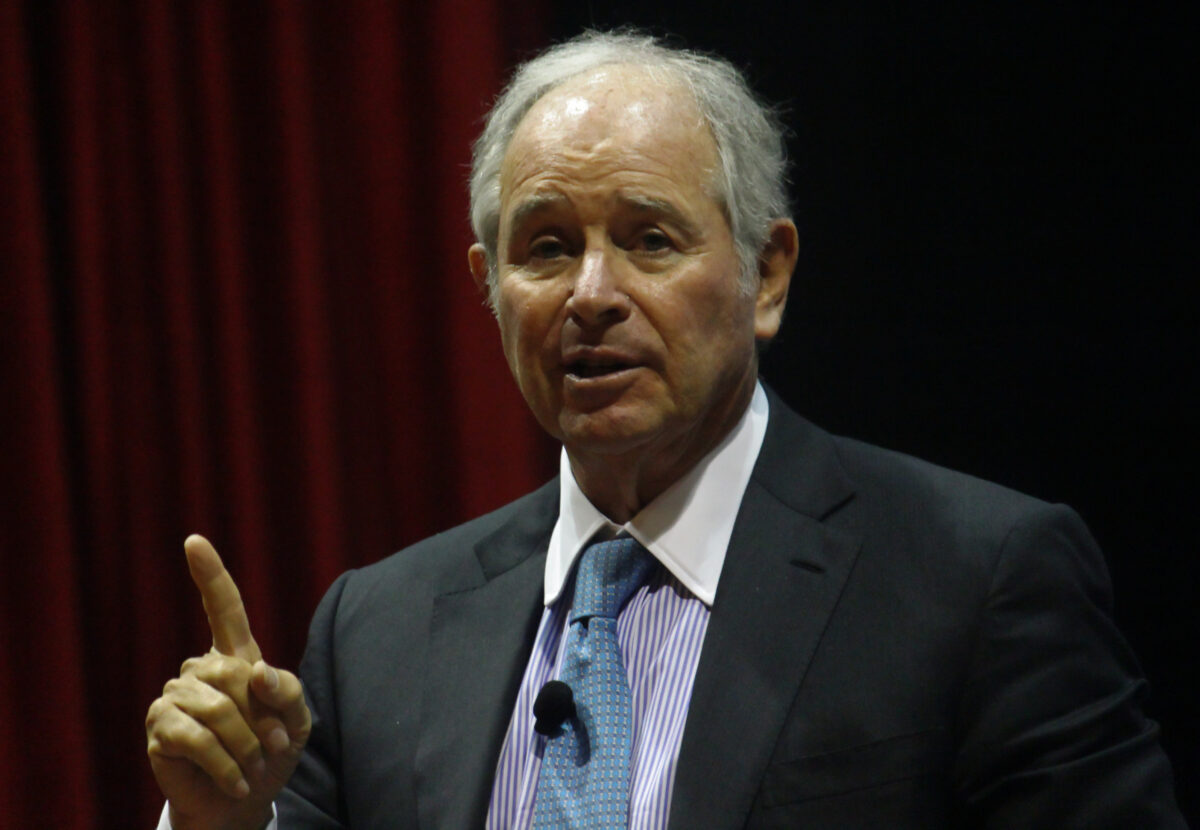Your Daily Phil: Is the IDF short on equipment?
Good Thursday morning.
In today’s edition of Your Daily Phil, we report on the responses by American universities to the terror attacks in Israel and donations being made to Israeli causes by major corporations. We feature an opinion piece from Jeffrey Herbst, as well as an open letter by Marc Rowan. Also in this newsletter: Yuri Milner, Eli Beer and Doron Almog. We’ll start with a look into the widespread calls for donations of equipment to the Israel Defense Forces.
Over 360,000 reservists have been called up since the outbreak of war on Saturday in the largest Israel Defense Forces enlistment in 50 years, reports eJewishPhilanthropy’s Judah Ari Gross.
Almost immediately, those reservists began putting out calls for donations for equipment: from food to socks to kneepads to ceramic armor to medical equipment. The spouses of reservists have organized fundraising drives to raise money for the equipment; communities in the United States have “adopted” units in order to provide them with gear; and volunteers across Israel have transported supplies to military bases on the northern and southern borders.
The military, however, has been adamant that there are no significant equipment shortages.
So what gives? The answer is somewhat more complex and nuanced than it may immediately seem. To a large extent, the widespread requests for equipment by military units and the IDF’s insistence that there are no serious shortages do not conflict with one another.
The IDF’s Technological and Logistics Directorate has clear designations of what equipment is needed for different units based on the missions that they will perform. An elite reconnaissance unit being sent into enemy territory is therefore provided different, higher-quality equipment than a unit that is guarding a military outpost.
“The equipment is in accordance with the type of mission, and that’s what we plan for. We did not intend to give all 300,000 [reserve] soldiers ceramic vests. Everyone who will be in combat has a ceramic vest,” Maj. Gen. Michel Yanko, head of the IDF Technology and Logistics Directorate, told journalists this week.
Separately, there are pieces of equipment that the military does not necessarily provide, but that soldiers do indeed require such as duct tape, paracord and multi-tools, which are all regularly used by soldiers. These too are being donated widely by civilians, as are non-combat related supplies like soap, towels, cigarettes, underwear and socks. In the coming days and weeks, there will be mass donations of these types of goods from Israel and abroad, resulting in large surpluses (as occurred during the 2014 Gaza war).
Therefore, while the IDF is emphatic that there are no serious shortages, it has recognized that people intend to anyway make donations and is working to facilitate that effort in order to allow it to occur in the best way possible.
UNIVERSITY LETDOWN

Within hours of the start of Hamas’ terrorist attacks on Israel last Saturday, Jewish students at American universities began to look to fellow students and university administrators for words of comfort and support. But in the days since, many have expressed frustration at official university statements viewed as weak or halting — and anger and sadness at pro-Palestine student groups and faculty who have outright celebrated Hamas’ attacks, report Haley Cohen and Gabby Deutch for eJewishPhilanthropy’s sister publication Jewish Insider.
Not just sympathy: “University leaders need to do more than express sympathy. They need to condemn and confront anyone who glorifies or minimizes the deaths or celebrates Hamas,” said Jacob Baime, CEO of the Israel on Campus Coalition, which organized the letter.
Call out evil: “Unfortunately there are some universities that have failed to speak out clearly. They have fallen into the trap of references to cycles of violence and both sides-ism,” said Adam Lehman, CEO of Hillel International. “We have called on them to improve the way they are communicating on these issues and we will continue to call upon every university leader to speak clearly and forcefully around what there is really no excuse not to name, in terms of the evil that was perpetrated by terrorists in Israel over the weekend.”
Read the full report hereand sign up forJewish Insider’s Daily Kickoff here.
CORPORATE PHILANTHROPY
Blackstone Group pledges $7 million in aid to Israel

The investment management company Blackstone Group has joined a handful of major U.S. corporations committing millions to Israeli humanitarian relief efforts, following the deadly terror attacks by Hamas on Saturday. Blackstone pledged approximately $7 million to aid for Israel, the company’s CEO Stephen Schwarzman and President Jonathan Gray announced on Wednesday in an internal company-wide email, reports eJewishPhilanthropy’s Haley Cohen.
A growing crowd: Other large corporate contributions to support Israeli terror victims include Fox Corporation’s $1 million to the UJA-Federation of New York’s Israel Emergency Fund on Tuesday and New York-based venture capital firm Insight Partners pledge Monday to donate $1 million. Mastercard told staff on Wednesday that it would offer a 1:1 match for donations of $25 or more up to $15,000 per employee. The Mastercard internal giving site lists Magen David Adom and Leket Israel, which focuses on hunger and food security, as suggested organizations, according to an employee. Michael Bloomberg has also pledged to match donations to Magen David Adom.
HIGHER STANDARDS FOR HIGHER ED
Universities must urgently reconsider their approach to the issue of antisemitism on campus

“The old playbook of expressing regret when an antisemitic incident occurs is no longer good enough. … A university without a proactive antisemitism strategy is a university with a flawed approach to hatred on campus. It is time for Jewish leaders and supporters of Jewish students to make that case in as vocal a manner as possible,” writes Jeffrey Herbst, president of American Jewish University in Los Angeles, in an opinion piece for eJewishPhilanthropy.
Not holding back: “[B]efore the dead were even buried, dozens of college groups across the country had already declared their solidarity with the terrorist organization Hamas. … Jewish students and their supporters should expect that the atrocities, far from embarrassing fierce critics of Israel, will embolden those who had already made anti-Zionism their obsession.”
A deeper challenge: “[C]olleges have not directly confronted the quandary that a profound anti-Zionism, which sometimes morphs into antisemitism, is also a part of the culture of some foreign students’ homelands. Additionally, some students come from areas that have suffered from Israeli policies. The solution, of course, is not to preemptively tar foreign students with the label of ‘Jew-haters,’ but rather to recognize that schools have, to some degree, imported the Middle East conflict onto their campuses.”
CALL TO ACTION
Marc Rowan to funders: Show UPenn that words matter

“Two weeks and more than 1,000 slaughtered and kidnapped Israeli civilians later, UPenn has still not condemned the hate-filled Palestine Writes festival,” writes Marc Rowan, chairman of the Board of Advisors of The Wharton School and CEO of Apollo Global Management, in a letter published by eJewishPhilanthropy.
Why it matters: “In our viral digital world, it is especially dangerous when once-fringe ideologies receive a stamp of legitimacy and a cultural justification that allow hate-filled ideas to spread as acceptable alternatives. The misguided embrace of these ideologies by elite academic institutions normalizes and mainstreams what would otherwise be considered morally reprehensible.”
Money talks: “At this watershed moment in UPenn’s history, I call on all UPenn alumni and supporters who believe we are heading in the wrong direction to ‘close their checkbooks’ until President [Elizabeth] Magill and Chairman [Scott] Bok resign. … Join me and many others who love UPenn by sending the university $1 in place of your normal discretionary contribution, so that no one misses the point.”
Worthy Reads
Philanthropic Response: In The Chronicle of Philanthropy, Alex Daniels speaks with several foundations — Jewish and not — about their responses to Saturday’s terror attacks and the outbreak of war in Israel. “Reeling from the news of the attack on Israel, grant makers with close ties to the country pledged to help in its defense and to back efforts to provide humanitarian assistance in the face of war…Andrés Spokoiny, president of the Jewish Funders Network, told the 6,000 donors and grant makers who are part of the group that the need is urgent and will not fade any time soon. He urged them to give now, and to be ready to continue giving. ‘It’s very important that funders pace themselves,’ he wrote in an email message to members. ‘We understand the desire to help right now, but this is going to be a long and protracted war, and the rebuilding process will be even longer.’” [ChronicleofPhilanthropy]
Ideological Fractures: In The New York Times, Michelle Goldberg looks at how Saturday’s terror attacks have revealed a rift in left-wing circles. “On Tuesday evening, I was drinking on the porch of my friend and neighbor Misha Shulman, the Israel-born rabbi of a progressive New York synagogue called the New Shul. All day, he’d been on the phone with congregants deeply distraught over the massacres and mass kidnappings in Israel. Of all the people he spoke to, he said, those most devastated were either people who had lost close friends or family, or young Jews ‘completely shattered by the response of their lefty friends in New York,’ who were either justifying Hamas’s atrocities or celebrating them outright… Perhaps such hideous dogmatism shouldn’t be surprising. The left has always attracted certain people who relish the struggle against oppression primarily for the way it licenses their own cruelty… It’s too early to know how the left’s widespread failure of solidarity will change our politics, but I suspect some sort of fracture is coming.” [NYTimes]
AI and the Disinformation Wars: In an annual report released by Freedom House, researchers document the increased use of generative AI “to sow doubt, smear opponents, or influence public debate,” writes Tate Ryan Mosely for MIT Technology Review. “Authoritarian regimes, in particular, are using AI to make censorship more widespread and effective. Freedom House researchers documented 22 countries that passed laws requiring or incentivizing internet platforms to use machine learning to remove unfavorable online speech. … As generative AI tools grow more sophisticated, political actors are continuing to deploy the technology to amplify disinformation. … [I]n the United States, AI-manipulated videos and images of political leaders have made the rounds on social media. Examples include a video that depicted President Biden making transphobic comments and an image of Donald Trump hugging Anthony Fauci.” [MITTechReview]
Around the Web
The American Friends of the Magen David Adom donated 11 mobile intensive care units and six ambulances to the emergency medical service, which will arrive this week, as part of a major fundraising push following the outbreak of war on Saturday…
El Al, Israel’s national airline carrier, will begin offering flights on Shabbat, something it hasn’t done in 41 years, since the 1982 First Lebanon War. The flights will transport reservists from the U.S. and Asia in order to serve in the war against Hamas…
The United Hatzalah emergency service has purchased $15 million worth of medical supplies to restock its caches and prepare for further attacks in Israel. “This is the single largest medical supply purchase that this organization has ever made, and I fear it won’t be enough,” the group’s president and founder, Eli Beer, said in a statement…
Investor and philanthropist Yuri Milner donated $2.5 million to Tel Aviv’s Sourasky Medical Center, commonly referred to as Ichilov hospital, and $2.5 million to Magen David Adom through his Breakthrough Foundation…
Students at London’s Jewish Free School — the largest Jewish school in Europe — are being allowed not to wear their uniforms out of concerns they may be targeted for antisemitic attacks…
Playboy magazine announced it was cutting ties with adult film star Mia Khalifa over her social media posts praising Hamas terrorists…
Producer and University of Pennsylvania donor Dick Wolf endorsed a call to cut donations to the institution over its responses to antisemitism on campus made by the former chair of the Wharton School’s Board of Advisors Marc Rowan, who also said that the university’s president, Elizabeth Magill, and chair, Scott Bok, should resign…
Calif. Gov. Gavin Newsom signed into law a bill to better allow religious organizations and nonprofit colleges to develop affordable housing on their property. The legislation was promoted by the Jewish Public Affairs Committee of California, which declared its passage a “victory”…
Pic of the Day

Doron Almog, executive chairman of the Jewish Agency for Israel, hands a game to an Israeli girl yesterday in the Park Hotel in Netanya. The girl is a new immigrant from Ethiopia who had been living in a Jewish Agency absorption center until she was displaced by the fighting near the Gaza Strip this week.
Birthdays

Co-founder of Ares Management, he is also the owner of the NBA’s Atlanta Hawks, Tony Ressler…
Longtime baseball reporter for The New York Times, he is enshrined in the Baseball Hall of Fame, Murray Chass… Former U.S. ambassador to Italy, he is a co-founder of private equity firm Granite Capital International, Lewis Eisenberg… Longtime Fox News anchor now at CNN, Chris Wallace… President of Los Angeles-based Community Advocates, David A. Lehrer… Retired CEO of Wakefield, Mass.-based CAST, a nonprofit whose mission is to transform education for students with disabilities, Linda Gerstle… Pediatrician and medical ethicist, John D. Lantos, MD… Dermatologist in Los Angeles, Lamar Albert Nelson, MD… First female rabbi ordained in Conservative Judaism, Amy Eilberg… Deputy director of the White House’s National Economic Council until 2022, now a professor at Northeastern University, Seth D. Harris… Former executive director of Start-Up Nation Central, Wendy Singer… Editor of The Wall Street Journal‘s Weekend Review section, Gary Rosen… Managing director at Goldman Sachs, Raanan Agus… Los Angeles-based trial attorney for many high-profile clients, Babak “Bobby” Samini… Producer, actress and screenwriter, Alexandra Brandy Smothers… Former member of the Knesset, she now serves as the co-chair of the Green Movement of Israel, Yael Cohen Paran… Computer programmer, creator of the BitTorrent protocol and founder of Chia cryptocurrency, Bram Cohen… Only son of the current Rebbe of the Belz Hasidic dynasty, Rabbi Aharon Mordechai Rokeach… Israeli actress, model and television anchor, Miri Bohadana… Reporter and host of “The Daily,” a podcast at The New York Times, Michael Barbaro… Minority leader of the Florida Senate, Lauren Book… Journalist Rosie Gray… Argentine fashion model and artist, Naomi Preizler… Pitcher for the Staten Island FerryHawks of the Atlantic League, he had two relief appearances for Team Israel in the 2020 Olympics, Alex Katz…








